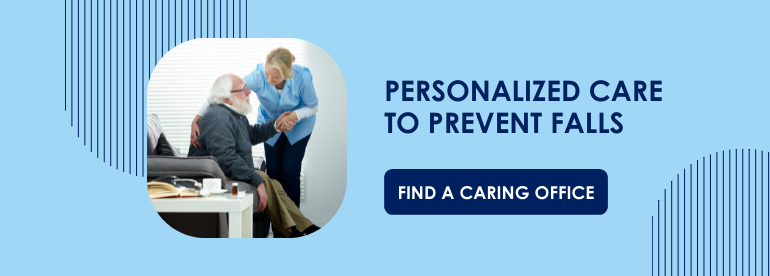1 in 4 adults age 65 and older will fall each year. There are many reasons that these falls could occur, including underlying health conditions. In fact, with Alzheimer’s disease or dementia are 4 to 5 times more likely to fall than seniors adults normal cognitive function. And of those seniors who fall, seniors with dementia are 3 times more likely to suffer from a bone fracture. Because of the higher risk of dementia patients of sustaining a fall, it’s important that friends and loved ones pay special attention to fall hazards around the home and any fall risk signs. In this post, we will discuss tips for reducing falls in seniors with dementia.
Why Dementia Patients Are At Higher Risk
First, let’s discuss why seniors with dementia are at higher risk of falling. Dementia and related cognitive diseases can cause a number of different symptoms that could lead to a fall, including the following:
- Impaired judgement: Seniors with dementia may not be able to recognize fall hazards and signs of risk. For example, they might not realize that the floor is wet or that they should sit down if they are feeling dizzy.
- Recognition of senses: Dementia can also cause changes in the senses, like sight, sound, and touch. Seniors with dementia may not recognize sensory input as they once did.
- Poor perception: Seniors with dementia may also have poor depth perception and interpretation of their environment. For example, they may not perceive a step down or they may experience illusions.
- Decreased memory: One of the main symptoms of dementia is impaired short-term memory. Seniors may have difficulty remembering new information, like if you told them the floor was wet and they should avoid walking through the kitchen.
- Poor coordination: Dementia can also affect the brain’s ability to coordinate movement with the muscles. As a result, seniors with dementia may have poor coordination, which can cause them to fall more easily.
As the disease progresses and symptoms worsen, a senior’s risk of falling increases as well. But understanding how dementia affects the brain and can increase the risk of a fall can help you be more prepared to anticipate potential falls at home.
Tips to Prevent Falls for Dementia Patients
There are many things you can do to protect a patient or loved one with dementia to help keep them safe.
- Check lighting. To help improve perception and heighten sight, make sure that the room is well lit but doesn’t have a lot of glare. Try to provide enough lighting to eliminate shadows, which can cause a single surface to appear like a 2 completely different ones and even at different heights.
- Create contrast. Another way to improve perception and heighten vision capabilities is to improve contrast in a room. For example, furniture should be a different color than the floor and the background. Choose solid colors over patterns. And try to avoid black in a space because it may be confusing and appear like a black hole.
- Remove clutter. As with any senior who is at risk of falling, you should help eliminate clutter in the home. This can help them avoid accidental trips and falls. Pick up clothes or toys on the floor and pay careful attention to high-traffic walkways. And don’t forget about outdoors! Make sure walkways and driveways are clear.
- Stay organized: It’s important to stay organized and keep items in the same place — one that is easily accessible by someone with dementia. You could arrange household items so that the frequently used items are within arm’s reach to help reduce falls. You could also arrange to keep information, notes, or reminders in a common area, like a dry erase board or on the fridge, to prevent a senior from wandering around and looking
- Focus on communication: Seniors with dementia may struggle to communicate and understand effectively. As you care for someone with dementia, pay attention to your language. If there is a risk of falling, help them understand by speaking in short sentences with simple language. And always remain positive.
- Consider their needs: When watching a senior to prevent falls, try considering their unmet needs and the reasons behind their actions. For example, if a senior is wandering around, ask yourself why. Maybe they are looking for a glass of water or for the telephone to call their spouse.
- Keep noise down: Because dementia affects a senior’s senses, high noise levels could startle a senior or cause them to get anxious and nervous. In turn, they may become unsteady on their feet, which can cause them to fall.
- Put on the right shoes: Prevent falls by making sure your loved one or patient has on the right shoes. Footwear should fit snugly and have good traction. Shoes that are too big might slip off, causing a senior to trip.
These tips can help you assist a patient or loved one with dementia and keep them safe. However, know that falls may still occur — despite a watchful eye and thoughtful precautions. If this does happen, make sure that a senior receives proper medical care and attention.
How Home Care Can Help
Senior home care services can also help keep a senior with dementia safe by providing personalized care to meet their unique needs. Caring Senior Service understands how dementia can affect individuals differently, and we train our caregivers on how to help dementia patients. We also offer a specialized care program around dementia to ensure that each senior gets the care they need. If your loved one is prone to falling and has dementia, a professional service may be a good option to keep your loved one safe. Reach out to our team of experts to discuss your options today!


